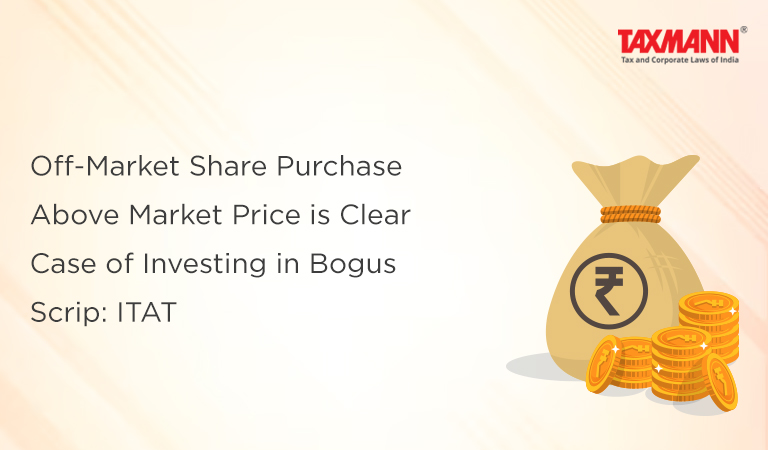Off-Market Share Purchase Above Market Price is Clear Case of Investing in Bogus Scrip: ITAT
- Blog|News|Income Tax|
- 2 Min Read
- By Taxmann
- |
- Last Updated on 24 April, 2023

Case Details: Atmiben Alipitkumar Doshi v. ITO - [2023] 149 taxmann.com 104 (Ahmedabad-ITAT)
Judiciary and Counsel Details
-
- Ms Suchitra Kamble, Judicial Member
- Vipul Khandhar, AR for the Appellant.
- R.R. Makwana, Sr. DR for the Respondent.
Facts of the Case
Assessee purchased shares of a company in cash in 2012 at Rs. 20 per share. During the year, the assessee sold said shares and gained Rs. 675 per share as long-term capital gains and claimed the same as exempt under section 10(38).
The Assessing Officer (AO) noted that there was an enquiry related to penny stock companies, and this scrip was under investigation. Therefore, AO made additions on account of such capital gains as unexplained income under section 68, thereby denying the claim of exemption on the same.
On appeal, the CIT(A) confirmed the addition made by the AO. Aggrieved-assessee filed the instant appeal before the Tribunal.
ITAT Held
The Tribunal held that the assessee purchased the shares in the scrip from Kappac Pharma Limited at Rs. 20/- per share in cash. Later the shares were sold on the Bombay Stock Exchange on different dates and gained Rs. 675 per share within 24 months. Further, the assessee bought shares at Rs. 20; however, the market price was Rs. 17.45.
The purchase of Kappac Pharma Limited shares appears bogus as the scrip when having a share price of Rs. 17.45 was purchased by the assessee at Rs. 20 outside the regular stock exchange. Merely because the assessee submitted his demat statement and transaction statement along with debit note and share certificate does not shun away the aspect that the assessee was very well aware of brokers in respect of penny stock.
Therefore, the AO and the CIT(A) rightly denied LTCG exemption under section 10(38), and additions made under section 68 were to be upheld.
List of Cases Referred to
-
- Prakash Javia HUF v. ITO [IT Appeal Nos. 464 & 465 (Ind.) of 2019, dated 25-5-2021] (para 5)
- Ayushi Jain v. ITO [IT Appeal No. 2551 (Kol.) of 2018, dated 9-8-2019] (para 5)
- Pr. CIT v. Jagat Pravinbhai Sarabhai [2022] 142 taxmann.com 247/289 Taxman 298 (Guj.) (para 5)
- Smt. Reshmiben P. Kanugo v. ITO [IT Appeal No. 2131 (Ahd.) of 2018, dated 28-2-2022] (para 5)
- Udit Kalra v. ITO 2019 (4) TM/834 (para 7).
Disclaimer: The content/information published on the website is only for general information of the user and shall not be construed as legal advice. While the Taxmann has exercised reasonable efforts to ensure the veracity of information/content published, Taxmann shall be under no liability in any manner whatsoever for incorrect information, if any.

Taxmann Publications has a dedicated in-house Research & Editorial Team. This team consists of a team of Chartered Accountants, Company Secretaries, and Lawyers. This team works under the guidance and supervision of editor-in-chief Mr Rakesh Bhargava.
The Research and Editorial Team is responsible for developing reliable and accurate content for the readers. The team follows the six-sigma approach to achieve the benchmark of zero error in its publications and research platforms. The team ensures that the following publication guidelines are thoroughly followed while developing the content:
- The statutory material is obtained only from the authorized and reliable sources
- All the latest developments in the judicial and legislative fields are covered
- Prepare the analytical write-ups on current, controversial, and important issues to help the readers to understand the concept and its implications
- Every content published by Taxmann is complete, accurate and lucid
- All evidence-based statements are supported with proper reference to Section, Circular No., Notification No. or citations
- The golden rules of grammar, style and consistency are thoroughly followed
- Font and size that’s easy to read and remain consistent across all imprint and digital publications are applied



 CA | CS | CMA
CA | CS | CMA
